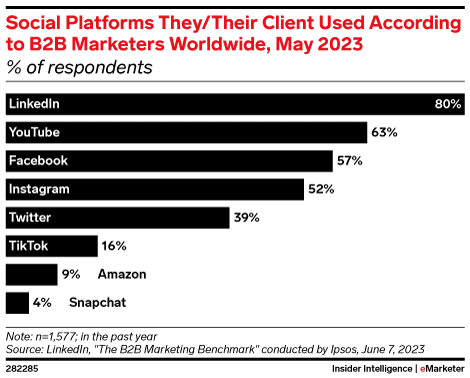Personalisation in marketing has emerged as a paramount strategy for connecting with today’s consumers. Generic marketing approaches must be revised to capture and retain audience attention and connection.
Consumers crave tailored experiences that speak directly to their unique preferences, interests, and needs.
As a digital marketing consultancy deeply committed to fostering meaningful connections between brands and their audience, we recognise the critical importance of personalised marketing strategies in driving success in 2024 and beyond.
The Significance of Personalised Marketing
Consumers today are inundated with a barrage of marketing messages vying for their attention.
Amidst this sea of content, traditional mass marketing tactics have lost their effectiveness, giving way to a more nuanced approach: personalised marketing.
At its core, personalised marketing is about more than just addressing recipients by their first name; it’s about understanding the individual behind the data points, aka ICP and crafting tailored experiences that resonate on a personal level.
Ideal Customer Profile (ICP) – The ideal customer profile (ICP) defines the firmographic, environmental and behavioural attributes of accounts expected to become a company’s most valuable customers.
In the below sections, I will explore the strategies and tactics brands should employ to implement personalised marketing strategies effectively and leverage the power of individual connections within the business.
Understanding Consumer Expectations
In this era of hyper-connectivity and information overload, consumers are bombarded with countless marketing messages daily. Amidst this noise, they seek authenticity and relevance from the brands they engage with.
Personalised marketing goes beyond mere segmentation based on demographics; it involves understanding the individual behind the data points. By delving into consumer behaviours, preferences, and purchase history, brands can tailor their messaging and offerings to resonate on a personal level. This enhances the customer experience and fosters trust and loyalty in the long run.
Driving Engagement and Conversions
At its core, marketing is about creating meaningful connections that drive action. Personalisation is a powerful tool for achieving this goal.
When consumers receive content that speaks directly to their interests and needs, they are more likely to engage with it. Whether it’s a personalised email, targeted social media ad, or tailored product recommendation, personalised marketing increases the likelihood of a positive response from the audience.
By delivering the right message to the right person at the right time, brands can guide consumers through the purchasing journey more effectively, leading to higher conversion rates and increased ROI.
 Strategies for Tailoring Marketing to Individuals
Strategies for Tailoring Marketing to Individuals
As the demand for personalised experiences continues to grow, brands must adapt their marketing strategies to meet consumers’ evolving needs and expectations.
Tailoring marketing to individuals requires a multifaceted approach that leverages data-driven insights, dynamic content creation, and segment-specific targeting to deliver relevant and engaging experiences at every touchpoint along the customer journey.
In the following sections, I will delve deeper into these strategies and explore practical tips and best practices for implementing personalised marketing tactics that resonate with individual consumers and drive business growth.
Data-Driven Insights
Information is power today.
By harnessing the wealth of data, brands can gain valuable insights into consumer behaviour and preferences. From website interactions to social media engagement, every interaction provides valuable cues that can inform personalised marketing strategies.
Investing in robust analytics tools and customer relationship management (CRM) systems allows brands to track and analyse customer interactions across multiple channels. With these insights, brands can create tailored marketing campaigns that resonate with their target audience personally.
Dynamic Content Creation
Static, one-size-fits-all content is a thing of the past. In 2024, brands embrace dynamic content creation to deliver personalised experiences to their audience.
The possibilities are endless, from AI-powered algorithms that personalise website experiences to dynamic email marketing campaigns that adapt to individual preferences. By creating content that resonates with each person on a personal level, brands can increase engagement, drive conversions, and foster brand loyalty.
Dynamic content allows brands to deliver relevant experiences that capture attention and drive action, whether a personalised video message or a customised product recommendation.
Segment-Specific Targeting
One-size-fits-all marketing is no longer effective in today’s fragmented digital landscape. By dividing their audience into segments based on demographics, interests, and buying behaviour, brands can create targeted marketing campaigns that speak directly to the needs of each segment.
Whether a special offer for loyal customers or a personalised recommendation for first-time buyers, segment-specific targeting allows brands to deliver the right message to the right audience at the right time.
By tailoring their messaging and offerings to specific segments, brands can increase relevance and drive engagement across their customer base.
The Importance of Personal Branding in 2024
Personal branding has emerged as a critical component of success for businesses and professionals alike, where competition is fierce and consumer trust is paramount. With consumers inundated with choices and information, establishing a solid personal brand is essential for standing out, building trust and credibility, and fostering meaningful connections with your target audience.
Building Trust and Credibility
Establishing trust and credibility is more important in an era where scepticism and mistrust abound.
Consumers are bombarded with marketing messages at every turn, making it increasingly challenging for brands to cut through the noise and capture their attention. Personal branding solves this problem by humanising the brand and allowing individuals to showcase their expertise, personality, and values. By sharing their knowledge, experiences, and insights, individuals can establish themselves as trusted authorities in their field, building credibility and earning the trust of their audience.
Problem: Differentiating From Competitors
Consider a scenario where a professional in the field of digital marketing needs help to differentiate themselves from competitors who offer similar services.
Despite having the necessary skills and expertise, they need help to stand out in a crowded marketplace and attract clients. Without a solid personal brand, they risk being overlooked in favour of competitors who have established themselves as trusted authorities in the industry.
Solution: Personal Branding
By investing in personal branding, digital marketing professionals can distinguish themselves from competitors and position themselves as thought leader in their field. By sharing valuable content, insights, and experiences on platforms such as LinkedIn, TikTok, and industry blogs, they can showcase their expertise and establish themselves as a go-to resource for clients seeking digital marketing services.
Over time, their personal brand becomes synonymous with excellence and credibility, attracting clients drawn to their unique voice and perspective.
Harnessing the Power of LinkedIn for B2B Personal Branding
LinkedIn stands out as the premier platform for building and promoting personal brands within B2B. With over 1 billion members worldwide, LinkedIn offers unparalleled opportunities for professionals to showcase their expertise, connect with industry peers, and establish themselves as thought leaders in their respective fields locally, nationally and globally.
LinkedIn’s Reach and Influence
Research indicates that 80% of B2B leads generated through social media come from LinkedIn (Insider Intelligence, 2023). This underscores the platform’s immense reach and influence within the B2B sphere, making it an indispensable tool for professionals looking to elevate their personal brands and expand their professional networks.
Building Authority and Trust
One of LinkedIn’s most compelling features is its ability to facilitate thought leadership and expertise sharing within industry-specific communities. By regularly publishing high-quality content, participating in relevant discussions, and engaging with like-minded professionals, individuals can position themselves as trusted authorities in their field and garner the respect and admiration of their peers.
Research indicates that 61% of LinkedIn users view the platform as an effective source of professional content, further underscoring its significance as a hub for thought leadership and knowledge sharing (LinkedIn, 2023).
Leveraging Networking Opportunities
Beyond content creation and engagement, LinkedIn offers many networking opportunities for professionals to connect with potential clients, collaborators, and industry influencers.
Through targeted outreach, participation in LinkedIn Groups, and attending virtual events and webinars, individuals can expand their professional networks and forge meaningful relationships with key stakeholders in their industry. Research suggests that 73% of B2B marketers believe LinkedIn is the most effective platform for generating leads and building professional relationships (LinkedIn, 2023), highlighting its unparalleled effectiveness as a networking tool for B2B personal branding.
Seizing the Opportunities on LinkedIn
LinkedIn has emerged as a powerhouse platform for B2B personal branding. It offers professionals unprecedented opportunities to showcase their expertise, build authority, and forge valuable connections within their industry.
By leveraging LinkedIn’s extensive reach and influence, individuals can elevate their personal brands, attract new opportunities, and solidify their positions as leaders in their respective fields.
Personalisation in Marketing Wrapped
In conclusion, personal branding is not just a buzzword; it’s a strategic imperative for individuals and businesses seeking to thrive in today’s competitive landscape.
From establishing trust and credibility to differentiating from competitors, personal branding plays a crucial role in shaping how you are perceived by your audience and building meaningful connections that drive success.
Importance of Personal Branding
Personal branding is more than just a logo or a tagline; it’s the essence of who you are and what you stand for. In an age where authenticity and transparency are valued, personal branding allows you to showcase your unique personality, expertise, and values, setting you apart from the competition and positioning you as a trusted authority in your field.
The Power of Personal Branding
Your personal brand is your most valuable asset in today’s digital age. It sets you apart from the competition and allows you to connect with your audience on a deeper level.
Whether you’re a freelancer, entrepreneur, or corporate professional, investing in your personal brand is essential for unlocking new opportunities, building lasting relationships, and achieving your professional goals.
Are you ready to unlock the power of personal branding and take your career or business to the next level?
Start by defining your unique value proposition, identifying your target ICP, and crafting a compelling brand story that resonates with your audience.
Then, leverage digital platforms such as social media, blogs, and professional networking sites to share your expertise and engage with your audience.
Remember, consistency is key – stay true to your values, maintain a cohesive brand identity, and always strive to provide value to your audience. By doing so, you’ll create a personal brand that resonates with your audience and drives success in 2024 and beyond.





